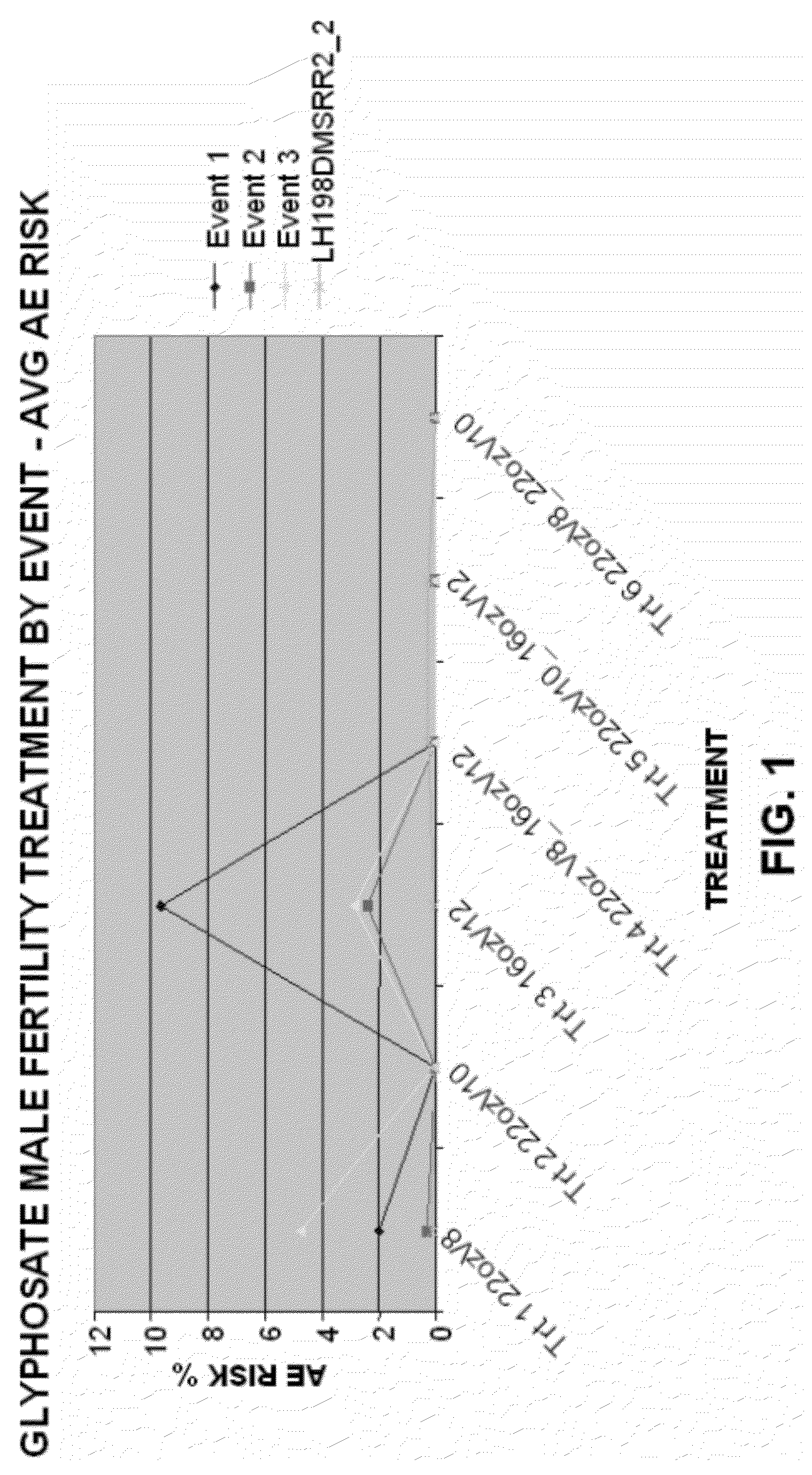Method to enhance yield and purity of hybrid crops
a technology of hybrid seed and purity, applied in the field of enhancement, can solve the problems of high production cost, high production cost, and high cost of transgenic traits, and achieve the effects of enhancing the presence of traits in hybrid seed, enhancing the purity of traits and genotypes, and reducing production costs
- Summary
- Abstract
- Description
- Claims
- Application Information
AI Technical Summary
Benefits of technology
Problems solved by technology
Method used
Image
Examples
example 1
[0068]Transgenic corn plants are produced by transforming a corn plant cell with a DNA construct. The DNA construct comprises a promoter operably linked to a glyphosate tolerance coding sequence. A promoter that provides vegetative and female tissue expression and less expression in pollen producing cells is preferred. For example, DNA virus promoters such as the cauliflower mosaic virus 35S promoter, or figwort mosaic virus promoter or versions of these promoters that contain duplicated enhancer regions provide transgenic plants that can be selected from a population of transgenic plants with the desired level of expression of the glyphosate tolerance coding sequence. Additional promoters can be used in the construct and tested for providing the desired level of glyphosate tolerance in a transgenic corn plant.
[0069]A DNA construct is transformed into a corn cell and the cell regenerated into a fertile plant, the DNA construct comprises a cauliflower virus CaMV 35S promoter (U.S. Pa...
example 2
[0087]Trait purity and genotype purity is determined by producing hybrid seed by the method of the present invention in which the field is also planted with potentially contaminating traits and genotypes. The hybrid seed production format is a female:male row ratio of 4:1. Event GHS1 and event GHS2 that are in an LH198 germplasm are used as the female parents and will be sterilized with glyphosate, and the male parents are either nk603 Roundup Ready® corn event (U.S. Pat. No. 6,825,400, herein incorporated by reference in its entirety) or MON88017 event (linked glyphosate tolerant and corn rootworm tolerant, WO05059103, herein incorporated by reference). Different transgenic male parents can be used that contain a transgene for glyphosate tolerance and are not susceptible to male sterility by glyphosate treatment at the rates useful to provide male sterility in the female parent. The male plants may additionally contain transgenic traits of agronomic importance (Table 1) or desirabl...
example 3
[0093]The yield of hybrid seed is important for maintaining profitability in hybrid seed production systems. Surprisingly, we discovered that the hybrid seed yield is increased using the glyphosate hybridization system relative to the CMS system. GHS1 and GHS2 are used as the female parent in a hybrid seed production field with MON88017 or nk603 as the male parent. The GHS fields were treated with glyphosate (V8 and V10 at 22 oz / ac) and the seed harvested from the female rows. Table 6 shows data collected from the test in which GHS1 or GHS2 is pollinated with a male parent, MON88017 or nk603. The average yield is 29.72 kilograms (kg) and 33.39 kg, respectively compared to the CMS-nk603 yield of 29.05 kg.
[0094]
TABLE 6Yield of the hybrid seed.Total wtAverageEvent(KG)Wt (kg)GHS1, MON8801725.929.72GHS1, MON8801731.5glyphosateGHS1, NK60332.16treatedGHS1, NK60329.35V8-V10GHS2, MON8801727.533.39GHS2, MON8801735.74glyphosateGHS2, NK60338.67treatedGHS2, NK60331.66V8-V10CMS, NK60336.1129.05CM...
PUM
| Property | Measurement | Unit |
|---|---|---|
| purity | aaaaa | aaaaa |
| transgene trait purity | aaaaa | aaaaa |
| genotype purity | aaaaa | aaaaa |
Abstract
Description
Claims
Application Information
 Login to View More
Login to View More - R&D
- Intellectual Property
- Life Sciences
- Materials
- Tech Scout
- Unparalleled Data Quality
- Higher Quality Content
- 60% Fewer Hallucinations
Browse by: Latest US Patents, China's latest patents, Technical Efficacy Thesaurus, Application Domain, Technology Topic, Popular Technical Reports.
© 2025 PatSnap. All rights reserved.Legal|Privacy policy|Modern Slavery Act Transparency Statement|Sitemap|About US| Contact US: help@patsnap.com

